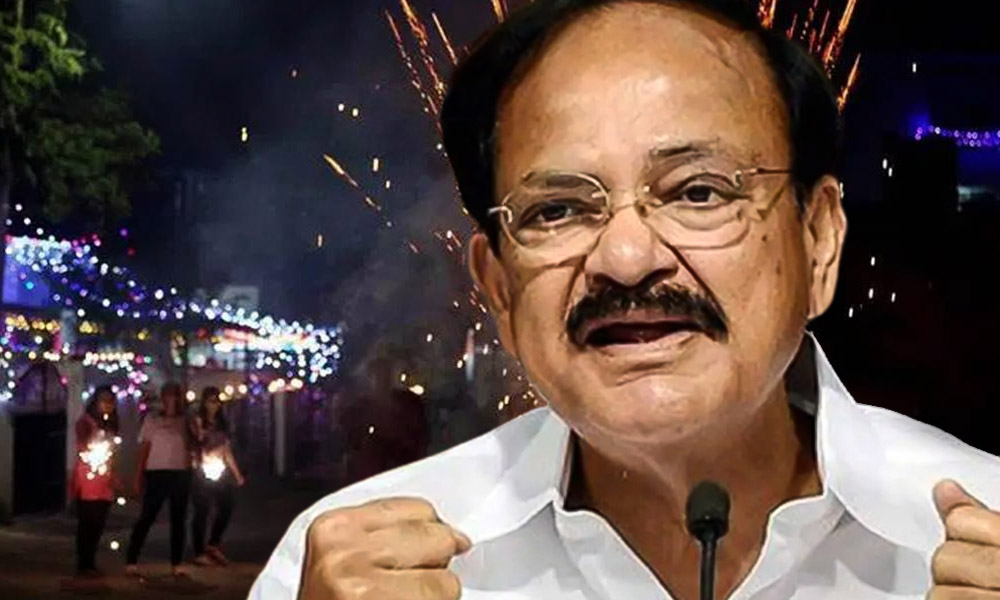
'Ban On Firecrackers An Example Of Judicial Outreach': Vice-President Venkaiah Naidu
Writer: Navya Singh
Navya writes and speaks about matters that often do not come out or doesn’t see daylight. Defense and economy of the country is of special interest to her and a lot of her content revolves around that.
India, 26 Nov 2020 10:38 AM GMT
Editor : Prateek Gautam |
A free soul who believes that journalism, apart from politics, should stand for social cause and the environment.
Creatives : Rajath
A free spirit who find meaning in life with the virtue of creativity and doing job par its excellence, animal lover and traveller by heart.
Speaking about the legislatures, Naidu said that over the last few years, conduct of MLAs, rising number of legislators with criminal history, flaunting of power have together led to a negative perception against the legislatures and its members.
Raising concerns over some of the recent judicial pronouncements, Vice-President M. Venkaiah Naidu spoke about "judicial overreach" and said that it has has led to questions over whether the judiciary was barging into the domains of the legislative and the executive.
Speaking at the inaugural session of the 80th All India Conference of Presiding Officers at Kevadia, Gujarat, on the topic 'Harmonious Coordination between Legislature, Executive and Judiciary— Key to a Vibrant Democracy', Naidu referred to some of the judicial pronouncements calling them a "distinct impression of an overreach".
"For example, the Diwali fireworks; cess on registration and movement of vehicles from the National Capital Region through Delhi; banning use of vehicles of certain make after 10 or 15 years; monitoring police investigations," Naidu said, adding that the others included "denying the executive any role in the appointment of judges by instituting collegium, which is said to be an extra-constitutional body, and invalidating the National Judicial Accountability Commission Act are being cited as instances of judicial overreach."
The vice-president said these actions led to an avoidable "blurring of the contours demarcated by the Constitution".
"They have led to the question as to how the three organs of the state should respect the jurisdictional sanctity enshrined in the Constitution instead of arrogating to themselves a sense of supremacy," Naidu said. "The moot question is does our Constitution envisage any of these three to be supreme?"
"Since Independence, the Supreme Court and High Courts have delivered several far-reaching verdicts in furtherance of socio-economic objectives besides making correctional interventions," the vice-president said.
"But occasionally, concerns have been raised as to whether they were entering the domains of the legislative and the executive wings," he said. "There have been debates as to whether some issues should have been more legitimately left to the other organs of the government."
Naidu further said that harmony lies in each organ doing its job, without interfering with that of the others. "This warrants a spirit of mutual respect, responsibility and restraint. Unfortunately, there have been several instances of crossing the boundaries," he said.
Our Constitution has identified clear domains for each of the three organs on the lines of separation of powers, he said.
"We consider our state to be in its best state when each of the three organs of the state performs to the best of its potential in the domain specified for each of them, in pursuit of the mandate defined and in the manner prescribed in the Constitution," he said.
"The case of India since Independence is no exception. So, it is appropriate for us to take stock of the harmonious working of the three organs," he said.
Speaking about the legislatures, Naidu said that over the last few years, conduct of MLAs, rising number of legislators with criminal history, flaunting of power have together led to a negative perception against the legislatures and its members.
Also Read: Drastic Drop In Citation Of Supreme Court Judgments By Foreign Courts Post 2014, Study Reveals
 All section
All section














